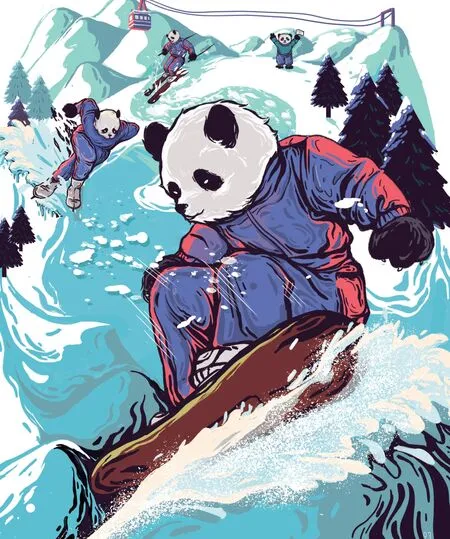ON THE CHARACTER
2022-03-01
A character that moves the body and the mind
生命在于运动

The sight of green grass gently swaying in the wind might sound relaxing to some,but not for Wu Zixu (伍子胥),a general and politician in the Spring and Autumn period (770–476 BCE),who had to flee for his life after his father and brother were executed by the king of Chu State.According to the story collectionDunhuang Adaptions(《敦煌变文集》),he was so terrified of being ambushed he would “风吹草动,即便藏形 (fēngchuī cǎodòng,jíbiàn cángxíng,hide out at the rustle of grass in the wind).”
Wu eventually escaped to serve the king of Wu State,and led the Wu army back to the Chu capital to take his revenge 16 years later.Meanwhile,his story gave rise to the idiom 风吹草动,meaning signs of disturbance or trouble.Like the idiom suggests,the most common meaning for 动 (dòng)is “to move,” as opposed to being still,or 静 (jìng).The character’s traditional form is,with 重 (zhòng) suggesting its pronunciation,and 力 (lì,strength)representing its meaning—that it has something to do with using strength.
In ancient Chinese,though,动 can also mean “to act.” InThe Art of War(《孙子兵法》),Spring and Autumn period military strategist Sun Tzu (孙子) emphasized caution before action by stating “非利不动 (fēi lì bú dòng,do not act unless there are benefits to gain).” But once the battle starts,Sun Tzu regarded swiftness the top priority,which begot the idiom “静如处子,动如脱兔 (jìng rú chǔzǐ,dòng rú tuōtù,stay calm like a coy maiden,but once in action,move like an escaping hare).”
In modern Chinese,动 usually means “to move” or “to be in motion,”such as 你坐着千万别动 (nǐ zuòzhe qiānwàn bié dòng,sit tight and don’t move).To set out on a journey is 动身 (dòngshēn),literally “to move one’s body,” while 动粗 (dòngcū,“to move roughness”) means to use violence.But in times of conflict,a folk saying teaches us 君子动口不动手 (jūnzǐ dòngkǒu bú dòngshǒu,a civil person uses mouth [to argue],not hands[to fight]).
THIS CHARACTER MOVES PEOPLE NOT ONLY PHYSICALLY,BUT ALSO EMOTIONALLY.

The common term 运动 (yùndòng,exercise,movement) can be applied to everything related to physical exercise and sports,from 运动员 (yùndòngyuán,athletes) to 运动场 (yùndòngchǎng,sports field) to 奥林匹克运动会(Aolínpǐkè Yùndònghuì,Olympic Games).The term can also refer to social movements,as in 五四运动 (Wǔ-Sì Yùndòng,May Fourth Movement),a period of literary and social progress in the early 20th Century.The idiom“生命在于运动 (shēngmìng zàiyú yùndòng,life lies in movement)” is often attributed to French philosopher Voltaire.Whether he said those exact words is debatable,but the suggestion to get healthy exercise is always welcome.
The character 动 moves people not only physically,but also emotionally.For instance,小伙子的话感动了姑娘 (xiǎohuǒzi de huà gǎndòngle gūniang,the young man’s words moved the young woman).To have one’s heart moved,or 动心 (dòngxīn),means to develop affection or passion for someone or something;while to have one’s temper or anger moved is 动气 (dòngqì) or 动怒 (dòngnù),bothmeaning “to be angry.” A good story or an inspiring event has a special power to move people,or 动人心弦(dòngrénxīnxián,strike a chord in one’s heart),while the phrase 动人 alone refers to something that is touching or moving.Similarly,动听 (dòngtīng,“move hearing”) describes beautiful music or flattering words.In a world full of temptation and influence,不为所动 (bùwéi suǒdòng),or to hold one’s ground unmoved,is not always easy,but perhaps worth the effort.After all,there is a price to pay for 轻举妄动(qīngjǔ wàngdòng,taking reckless action).
